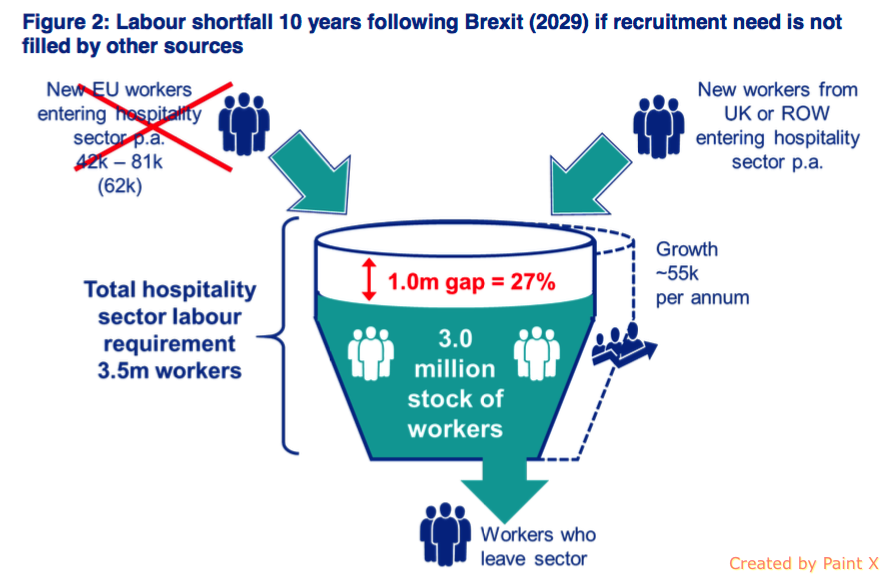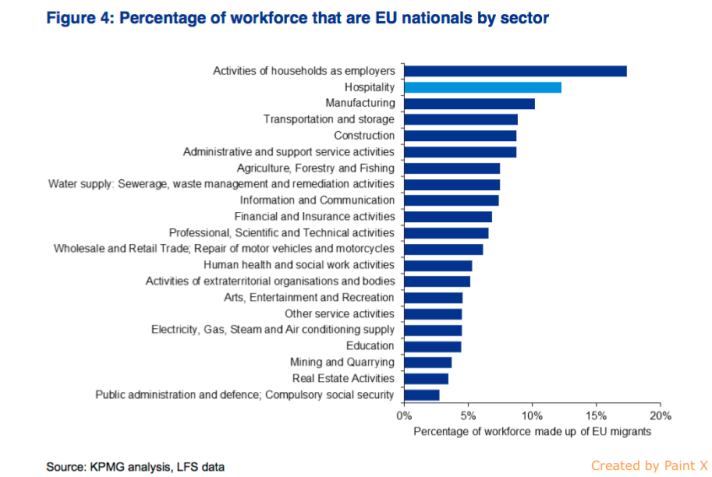“100 per cent rise in hate crimes since Brexit”
The triggering of Article 50 for Britain’s exit from the EU has left many in the hospitality sector feeling insecure about their future. Across England and Wales there was a 27 per cent rise in hate crimes since the Brexit vote, with some areas even reporting a rise of up to 100 per cent. The bar and waiting industries have not been spared.
With Brexit expected to end free movement from the EU to Britain, a panic across Britain’s fourth biggest industry has arisen. As well as worrying about the security of their jobs, non-British-national bar and waiting staff are also suffering at the hands of this misplaced patriotism.
“In the last month, I’ve had to call the police twice”
Kasia Dagmara, 33, a Polish Assistant Manager at a London pub, said she had suffered from racist attacks multiple times since the EU referendum last June: “Just in the last month I’ve had to call the police twice,” she said: “Last time it was a Welsh guy who kept demanding I tell him where I was from. I told him it didn’t matter, then he started shouting at me that I was ‘one of them poles’. I’m proud I’m Polish and I don’t need some drunk guy telling me I should be ashamed of where I’m from and that I should go back home, despite living in England for the past eleven years of my life.”
Kasia’s case is not unusual, however many such incidents go unreported. “The first few times I just ignored it,” she said. England, despite voting to leave the EU, relies less on EU migrants in the hospitality sector than Scotland does. Scotland, which voted an overwhelming 62 per cent to remain, has a hospitality sector which is 58 per cent staffed by EU migrants, compared to England’s 45 per cent.
“24 per cent of the hospitality workforce are non-UK nationals”
According to People 1st’s Migration and labour restrictions report, 24 per cent of the hospitality workforce in the UK are non-UK nationals and six per cent of the migrant population in the country enter employment within this industry. This is much larger than the national average, with 16 per cent of the UK workforce being of a non-British-national background.

Despite Kasia’s case, the British economy relies heavily on the EU’s freedom of movement. Particularly in the area of small businesses and enterprises. Samir Maqedonci, an independent business owner from Kosovo, said that he relies on EU staff to maintain his café. “It would be nice to think that we could employ British staff, but they always leave after two weeks,” he said: “Because they know they can find something better and for a higher wage, which independent businesses can’t afford.”
“British people don’t want to work in the kitchen”
Mourid Bouderun, a French Algerian team leader at All Bar One, sustained Samir’s view when he told The Guardian: “British people don’t want to work in the kitchen, it’s too hard, it’s a big problem for restaurants all over London. At All Bar One the people in the kitchen are all foreign.”
According to the KPMG Labour migration in the hospitality sector report for the British Hospitality Association, between 12.3 per cent and 23.7 per cent of the UK hospitality sector workforce is made up of EU nationals. It has therefore been estimated that by 2024, the hospitality and tourism industry needs to recruit 1.3 million staff, due to the changes Brexit will bring. Between 2011 and 2015 the restaurant industry alone increased by over 120, 000 employees.
“Waiting staff are made up of 75 per cent EU nationals”
More starkly so, waiters and waitresses are made up of 75.3 per cent EU nationals, with 11.3 per cent of bar staff. Therefore, if the points-based system that was introduced in 2010 for non-EU nationals were to be applied, the low-earning and low-skilled workforce of bar and waiting staff would likely be deemed insufficient. This could lead to a mass decrease in immigration, leaving the diverse sector vulnerable in a tourism-based economy.

“I was spat at, told to go back home and just generally treated as an outsider.”
The anti-immigration rhetoric of the Brexit campaign has not just jeopardised the jobs and livelihoods of migrant workers, however. It has also disenfranchised British-born ethnic minorities. Ianthe Mellors, 26, is a former waitress and now professional dancer is British-born to a Trinidadian father and white-English mother. Ianthe said that she had suffered a myriad of attacks since the EU referendum results: “I was spat at, told to go back home and just generally treated as an outsider.”
A report by the Restaurant Opportunities Centers United and Forward Together, ‘Racial and Gender Occupational Segregation in the Restaurant Industry’ stated that workers of colour receive 56 per cent lower earnings when compared to equally qualified white workers.
Businesses in the sector are already showing signs of panic. Pret a Manger is offering 500 British 16-18-year-olds a week of unpaid work experience. The young workers would be offered free food, but no wage. With just one in 50 of Pret’s job applicants born in the UK, this desperate offer shows the frantic climate Brexit has caused.
“Businesses need to start considering alternative options”
While the referendum result led to many workers using it to promote diversity in the capital city, some hospitality staff have been left deflated. Paco Merola, 33, a waiter from Italy who has lived in London for nine years, said: “I was already thinking of moving to Berlin, but after this Brexit sh*t I’m thinking, why should I stay here anyway? I wasn’t born for hospitality. Obviously, the English don’t want me here.”
If migrants’ restrictions are to go ahead as expected, front of house staff would not be considered sufficiently skilled to fall into any skilled occupational category. Chefs would also need to be earning £35,000 per year as tier two employees. Therefore, businesses need to start considering alternative options such as improved wages for staff and realistic training opportunities, in order to overcome this prospective plight.

Reblogged this on the|sacred|inch.
LikeLike